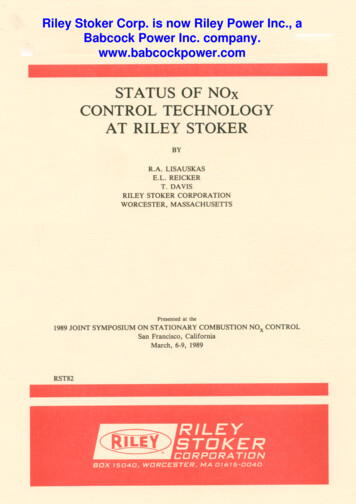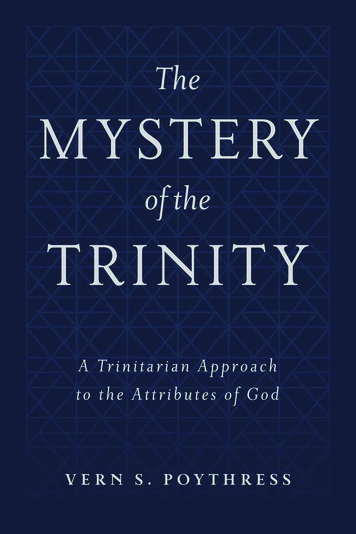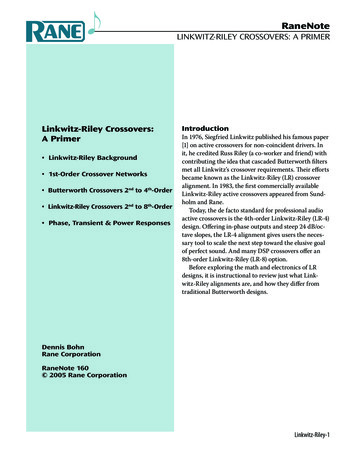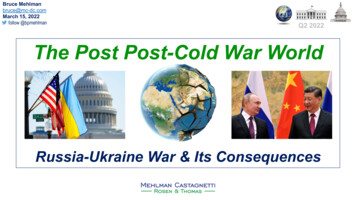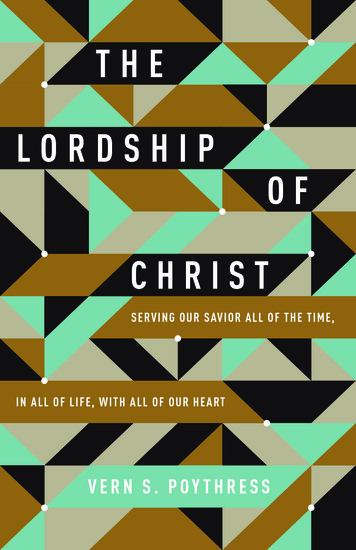
Transcription
“Vern Poythress’s fine book argues a truly radical thesis: that Jesus’s lordshipis as wide as creation and therefore as wide as our everyday activities. Heshows how Jesus’s saving works and Word apply to absolutely every sphereof life—to art and science, business and entrepreneurship, scholarship andeducation, politics and economics. Any Christian who wishes to honor theLord Christ in the totality of his or her life should buy this book and read itimmediately.”Bruce Riley Ashford, Provost and Associate Professor of Theology andCulture, Southeastern Baptist Theological Seminary“Vern Poythress is one of the few writers today who combines rigorous scholarship and biblical theology with deep, practical spirituality. This volume is adefense of the notion, so powerfully expressed in the Reformed tradition ingeneral and by Abraham Kuyper in particular, that Christ is Lord over everyarea of life. Building on this heritage, Poythress brings important clarifications along with practical applications not always found in the pioneers.Readers should not be deceived by the enviable simplicity of the arguments;they pack a wallop.”William Edgar, Professor of Apologetics, Westminster TheologicalSeminary“My good friend Vern Poythress has written Redeeming Science, RedeemingSociology, Redeeming Mathematics, and Redeeming Philosophy, as well asexcellent books on linguistics and logic. The Lordship of Christ expounds thefoundation beneath all these other studies—namely, the fact that Christ rulesover every area of human life. This is the principle rediscovered by AbrahamKuyper, that every square inch in the universe belongs to Jesus. Poythress’sbook contains a strong biblical defense of this principle. It also contains thebest discussion yet of the one-kingdom/two-kingdoms controversy.”John M. Frame, J. D. Trimble Chair of Systematic Theology andPhilosophy, Reformed Theological Seminary, Orlando“Thanks to Vern Poythress for providing an accessible, encouraging, practicalstudy on the lordship of Christ. Any Christian who has questions about theauthority of Christ and the joy of serving him will be greatly helped by thisbook. It revitalizes and reinvigorates a proper understanding of Christ the King.This book would be a useful tool for churches and Sunday school classes.”K. Scott Oliphint, Professor of Apologetics and Systematic Theology,Westminster Theological Seminary; author, Covenantal Apologetics
“For anyone looking for a clear, accessible, and biblically sound introductionto the kingship of Christ as understood in the Kuyperian strain of the Reformed tradition, this is the book that fills the bill. What makes the Kuyperianunderstanding of the kingdom so attractive to many is that it calls Christiansto be active in every sphere of society and culture (not least the academy),and this book does an excellent job of illustrating the cultural claims ofChrist’s rule. At the same time, Poythress is careful to highlight some of thepotential pitfalls of such an emphasis on Christian cultural engagement. Oneof the book’s strengths is its liberal use of pertinent Bible texts to illustrate itspoints, without falling into facile proof-texting. An added bonus is that thebook includes an extensive appendix in which the author enters into dialoguewith the proponents of so-called ‘two kingdoms’ theology, where in a nonpolemical way he points out some of the conceptual confusions that have toooften bedeviled the discussion around this topic.”Albert M. Wolters, Professor Emeritus of Religion, RedeemerUniversity College; author, Creation Regained
The Lordship of Christ
Other Crossway Books by Vern S. PoythressChance and the Sovereignty of God: A God-Centered Approachto Probability and Random EventsInerrancy and the Gospels: A God-Centered Approach to theChallenges of HarmonizationInerrancy and Worldview: Answering Modern Challenges to the BibleIn the Beginning Was the Word: Language—A God-Centered ApproachLogic: A God-Centered Approach to the Foundation ofWestern ThoughtThe Miracles of Jesus: How the Savior’s Mighty Acts Serveas Signs of RedemptionRedeeming Mathematics: A God-Centered ApproachRedeeming Philosophy: A God-Centered Approachto the Big QuestionsRedeeming Science: A God-Centered ApproachRedeeming Sociology: A God-Centered Approach
The Lordship of ChristServing Our Savior All of the Time,in All of Life, with All of Our HeartVern S. Poythress W H E AT O N , I L L I N O I S
The Lordship of Christ: Serving Our Savior All of the Time,in All of Life, with All of Our HeartCopyright 2016 by Vern S. PoythressPublished by Crossway1300 Crescent StreetWheaton, Illinois 60187All rights reserved. No part of this publication may be reproduced, stored in aretrieval system, or transmitted in any form by any means, electronic, mechanical,photocopy, recording, or otherwise, without the prior permission of the publisher,except as provided for by USA copyright law. Crossway is a registered trademark inthe United States of America.Cover design: Jeff Miller, Faceout StudioFirst printing 2016Printed in the United States of AmericaScripture quotations are from the ESV Bible (The Holy Bible, English StandardVersion ), copyright 2001 by Crossway, a publishing ministry of Good NewsPublishers. Used by permission. All rights reserved.All emphases in Scripture quotations have been added by the author.Trade paperback ISBN: 978-1-4335-4953-3ePub ISBN: 978-1-4335-4956-4PDF ISBN: 978-1-4335-4954-0Mobipocket ISBN: 978-1-4335-4955-7Library of Congress Cataloging-in-Publication DataNames: Poythress, Vern S.Title: The lordship of Christ : serving our Savior all of the time, in all of life, with all of our heart /Vern S. Poythress.Description: Wheaton : Crossway, 2016. Includes bibliographical references and index.Identifiers: LCCN 2015036850 (print) LCCN 2015032926 (ebook) ISBN 9781433549540 (pdf) ISBN 9781433549557 (mobi) ISBN 9781433549564 (epub) ISBN 9781433549533 (tp)Subjects: LCSH: Service (Theology) Christian life. Jesus Christ—Lordship.Classification: LCC BT738.4 (print) LCC BT738.4 .P69 2016 (ebook) DDC 248.4—dc23LC record available at http:// lccn .loc .gov /2015 0 3 6 8 50Crossway is a publishing ministry of Good News 164321
ContentsPart 1THE CA L L T O S ERV E C HR I S T1 Being Radically Christian 112 The Story of Redemption 193 Reasons for Obedience to Christ 314 Serving Christ in Our Knowledge 415 Contrasts with the World 49Part 2RE SOURCE S F O R S ERV I N G C HR I S T6 Basic Spiritual Resources 637 Resources from Theology, Especially the Reformation 678 Abraham Kuyper and His Successors 739 Newer Resources 81Part 3ARE A S OF SERV I C E10 Christ the Lord of Life and Religion 9511 Politics 10312 Science 111
13 Art 11714 The Future 11915 Education 12316 Work 127Part 4TR AP S TO AVO I D I N O U R S ERV I C E17 Traps in Motivation 13718 Traps in Norms 14519 Traps in Situations 15320 Traps concerning Future Hopes 159Conclusion 173Appendix: Two Kingdoms Theology 175Bibliography 209General Index 214Scripture Index 220
Part 1T H E CA LL TOS E RV E C H R I S T
1Being Radically ChristianThe Bible has a radical, earthshaking message about Jesus Christ.It says that Jesus Christ is not merely a human being, not merelya famous religious teacher, but the Lord of the universe. Matthew28:18 includes this claim: “All authority in heaven and on earthhas been given to me [Jesus].” Similarly, Ephesians 1:22 says, “He[God] put all things under his [Christ’s] feet.”That message has profound implications for everyone livingon the face of the earth. It has implications especially for what wethink—for the life of the mind. It has implications not only forindividuals but also for society. This book concentrates especiallyon these two points—implications for the mind and for society.Implications for SocietyHow does the lordship of Christ have implications for society?In the modern West, many cultural leaders wish to keep religionprivate. They say, “Keep it to yourself,” or “Keep it inside yourfamily.” Cultural leaders want most of life to be “secular,” a realmwhere religion makes no difference. They say, in effect, “Keepyour Jesus out of business, work, education, science, technology,government, politics, entertainment, media, and the arts.” But if
12The Call to Serve ChristJesus is in fact Lord of all, he is Lord of all these areas of life. Heis already there in his divine authority and power and presence.You cannot “keep him out.” And trying to keep him out is alreadya violation of his claims to lordship.Implications for Non-Christians and for ChristiansThe message of the Bible has implications for all non-Christians,because Christ is Lord over each of their lives. Christ makes aclaim on each human life. If he is Lord, he demands allegiance. Heis not just someone you call in or consider if you think you needhim. Nor is he someone who makes a claim only on Christians.His claim extends to everyone.The lordship of Jesus Christ also has implications for everyonewho is already a Christian believer. Many a person who claims tobe a Christian drifts along without concerted attention to what itmeans to say that Jesus is Lord. A Christian may feel some kindof attachment to Jesus Christ but still not take seriously the radical changes that should take place with those who follow Christ.Who Is a Christian?Here we should observe that the word Christian in our day canbe used quite loosely. There are people who consider themselvesChristian because they live in the United States, and they supposethat the United States is a Christian nation (after all, it is not reallyBuddhist or Jewish or Muslim; only a small minority of US residents have these other religious commitments). Or they think theyare Christian because their parents were Christian, or because theywere once baptized, though they no longer believe much regardingthe person of Christ. Then there are people who have some respectfor Jesus Christ and who may read the Bible and go to church.But they still have not put their trust in Christ for salvation, andthey do not have a personal relationship with God the Father andChrist his Son, established by the Holy Spirit.In contrast to all these people, I have in mind born-again Chris-
Being Radically Christian13tians, those who actually believe in Christ and follow him. Buteven the term born-again has its problems. People may think theyare born again merely because they had an experience of religiousexcitement at some point, and they seemed for a while to feel differently about God and the world. Or they professed to make acommitment to Christ at some point, but their commitment wassuperficial and they did not really change.That is not what the Bible means by being born again. Beingborn again is a radical change brought about by the Holy Spirit.Jesus answered him, “Truly, truly, I say to you, unless one isborn again he cannot see the kingdom of God.” (John 3:3)Jesus answered, “Truly, truly, I say to you, unless one is bornof water and the Spirit, he cannot enter the kingdom of God.That which is born of the flesh is flesh, and that which is bornof the Spirit is spirit. Do not marvel that I said to you, ‘Youmust be born again.’” (John 3:5–7)For everyone who has been born of God overcomes the world.And this is the victory that has overcome the world—our faith.Who is it that overcomes the world except the one who believes that Jesus is the Son of God? (1 John 5:4–5)We know that everyone who has been born of God does notkeep on sinning, but he [Jesus] who was born of God protectshim, and the evil one does not touch him. (1 John 5:18)Being born again involves being delivered from the power of eviland experiencing salvation.Radical ChangeWhat happens when we acknowledge the lordship of Christ?Taking seriously the lordship of Christ involves radical change.Radical change can sound hard and unappealing. In some respectsit is not only hard but impossible. At a fundamental level, we
14The Call to Serve Christcannot change ourselves by our own power. But the good newsof Christ includes the promise of his presence and his transforming power. “What is impossible with man is possible with God”(Luke 18:27). God delivers us from the invisible chains in life fromwhich we could never deliver ourselves: “He has delivered us fromthe domain of darkness and transferred us to the kingdom of hisbeloved Son, in whom we have redemption, the forgiveness ofsins” (Col. 1:13–14).The fundamental problem is the problem of sin and guilt. “Youwere dead in the trespasses and sins in which you once walked”(Eph. 2:1–2). Only as we begin to see the magnitude of the problem do we give up following our own ways and making up ourown rules and following our own desires.One fundamental change is in our status before God. Wechange from being guilty to being forgiven. God is holy, and oursins have made us guilty before him. He created us and we oweeverything to him. But we have broken his law and dishonoredhis name. We deserve death: “The wages of sin is death” (Rom.6:23). Through Christ God promises to forgive our sins: “If weconfess our sins, he is faithful and just to forgive us our sins andto cleanse us from all unrighteousness” (1 John 1:9). Christ borethe penalty for our sins, and we are counted righteous because ofthe righteousness of Christ (2 Cor. 5:21). “He himself bore oursins in his body on the tree, that we might die to sin and live torighteousness. By his wounds you have been healed” (1 Pet. 2:24).The changes that God brings about include changes in thewhole person: “If anyone is in Christ, he is a new creation” (2 Cor.5:17). The fundamental change is as radical an event as beingborn, as we saw from John 3:3 and 3:5 above.The changes include not only new beliefs but also new standards of judgment that we bring to the table when we are considering claims about truth. The changes include different behavior:we no longer try to make up our own moral standards but insteadsubmit to the law of Christ our King. We receive power through
Being Radically Christian15the Spirit of Christ to begin to walk in the ways of Christ: “Forthose who live according to the flesh set their minds on the thingsof the flesh, but those who live according to the Spirit set theirminds on the things of the Spirit” (Rom. 8:5).The changes include transformed attitudes and motives. Wegrow in loving Christ and in experiencing his love for us. Outof that love, we grow in loving others: “We love because he firstloved us” (1 John 4:19). We cast off hatred, jealousy, envy, selfishambition (Gal. 5:19–21; Col. 3:5; James 3:14).Change in the MindWe also change in our thinking, in our minds: “Do not be conformed to this world, but be transformed by the renewal of yourmind, that by testing you may discern what is the will of God, whatis good and acceptable and perfect” (Rom. 12:2). This change inthe mind takes place because the mercy of God has come to us,and we respond by devoting our whole selves to God: Thus, theapostle Paul writes, “I appeal to you therefore, brothers, by themercies of God, to present your bodies as a living sacrifice, holyand acceptable to God, which is your spiritual worship” (Rom.12:1). The change in our minds takes place as one aspect of alarger change, the transformation of the whole person. The Biblecalls us to give complete submission to God in every aspect of life:we “present [our] bodies as a living sacrifice” (Rom. 12:1).There are many good books providing Christians with resources for growing in their faith.1 We need to start at the beginning, by hearing the good news of what Christ has achieved in hisdeath and resurrection. We not only need to hear but also need tobelieve in Christ. God works in us through the Holy Spirit so thatwe trust in Christ and in the salvation that he has accomplished.We continue in the same way we have begun, by trusting inChrist. The most fundamental way of growing is through the1 I recommend J. I. Packer, Knowing God (Downers Grove, IL: InterVarsity Press, 1993), as onegood starting point.
16The Call to Serve Christmeans that God himself has provided, sometimes called “themeans of grace.” The means include reading and studying theBible, listening to the Word of God preached, praying, participating in the sacraments (baptism and the Lord’s Supper), and havingfellowship with believers in the body of Christ. When used by theHoly Spirit, these means bring about change in the whole person.Resistance from a Secular SocietyIn our environment, Christians do not always include in their ideaof change the particular kind of change mentioned in Romans12:2, the renewal of the mind. Change in behavior, yes. Change inattitudes by growing in love, yes. Change in beliefs, yes—at leastwhen a person initially becomes a follower of Christ. But whatabout change in the mind? Christians do not always think aboutthat area.As we have observed, the surrounding culture in modern Western countries does not encourage us to think about such changes.Cultural leaders want most of life to be secular. According to thisview, most of your thinking about business, work, education, andso on is supposed to be the same as everyone else’s. Christianity makes a difference only in private, or only when you are ina church building during a worship service. In this picture onlysmall pieces of life are influenced by the presence of Christ.Such a view is very different from the Bible’s principle thatChrist is Lord of everything and that our minds are to be transformed and renewed by his presence. It is also notably different from past centuries in Europe, when Christian principles hadwider influence on society, showing their effects in law, art, music,science, and many social organizations.Being radically Christian means no longer naively accepting thecultural message of secularity. We belong to Christ. Christ is Lordnot merely over individual souls but over the universe.As the message about Jesus Christ goes out to the world, Godis commanding everyone to repent and come to Christ: “The times
Being Radically Christian17of ignorance God overlooked, but now he commands all peopleeverywhere to repent, because he has fixed a day on which hewill judge the world in righteousness by a man whom he has appointed; and of this he has given assurance to all by raising himfrom the dead” (Acts 17:30–31). Coming to Christ in faith involves acknowledging that he is the universal Master and Lord:“If you confess with your mouth that Jesus is Lord and believe inyour heart that God raised him from the dead, you will be saved.For with the heart one believes and is justified, and with the mouthone confesses and is saved” (Rom. 10:9–10).The Call to ServiceWhat are the implications? Over a century ago, Abraham Kuypergrasped the implications and made a ringing announcement: “Nosingle piece of our mental world is to be hermetically sealed offfrom the rest, and there is not a square inch in the whole domainof our human existence over which Christ, who is Sovereign overall, does not cry: ‘Mine!’”2 In this book we will be exploring theimplications of the fact that Christ is indeed “Sovereign over all.”As we explore these implications, we should keep clear whatis the basis for our salvation. We are saved by the work of Christon the cross, not by our own good works. When we strive to obeyChrist, we do not do so because our works earn salvation for us.They could never be good enough for that. We serve Christ because we have already been saved, by grace alone. We respond ingratitude because we have come to love Christ. Christ has changedus, both by wiping away our guilt and by renewing our hearts.We could, if we wish, jump right into a discussion of whatChrist’s lordship means for politics, science, education, and other2 Abraham Kuyper, “Sphere Sovereignty,” in Abraham Kuyper: A Centennial Reader, ed. James D.Bratt (Grand Rapids, MI: Eerdmans, 1998), 488, italics original. The quote was originally partof Kuyper’s speech at the inauguration of the Free University of Amsterdam in 1880. Kuyper’sdeclaration about Christ’s lordship can be seen as exemplifying the biblical theme of exclusiveloyalty to God (Ex. 20:3; 1 Kings 18:21). This quote and the larger context of the life of AbrahamKuyper influenced a recent book on the topic: Bruce Riley Ashford, Every Square Inch: An Introduction to Cultural Engagement for Christians (Bellingham, WA: Lexham, 2015); see Ashford’scomment on p. 6.
18The Call to Serve Christareas of modern life. We will get to all that in part 3 of this book.But it is important that we not be too hasty. The transformationof life includes transformation of how we think about the challenge of radical change itself. What are the proper foundations forChristian living? And what are the resources for serving Christ?These questions deserve our attention here in part 1 and then inpart 2 respectively.
2The Story of RedemptionIf we are going to think through the life of the mind in the mostradical way, we must do it in the context of the complete picturegiven in the Bible. The Bible indicates that we live within a worldcreated by God, in a history governed by God, as human beingsresponsible to God. The view of the world presented in Scriptureis deeply at odds with the typical thinking of “modern man,” theperson who wants to break free of God and live in a secular world.It is appropriate, therefore, to review briefly the basic elementsbelonging to a biblical view of the world.What Is WrongThe Bible has a message about what is wrong with the worldand what is the fundamental answer to this wrong. This message involves Christ at its center. Through Christ, and him alone,human beings can have their sins forgiven and be reconciled toGod. Christ is the one Mediator between God and man, throughwhom the alienation between God and man is overcome.For there is one God, and there is one mediator between Godand men, the man Christ Jesus, who gave himself as a ransomfor all. (1 Tim. 2:5–6)
20The Call to Serve ChristAnd there is salvation in no one else, for there is no other nameunder heaven given among men by which we must be saved.(Acts 4:12)Jesus said to him, “I am the way, and the truth, and the life.No one comes to the Father except through me.” (John 14:6)The Message in ContextThis is the message of Christianity—that is, the message of Christianity properly understood. It is the message found in the Bible.And it is the message that was proclaimed by the followers ofChrist in the first centuries after Christ’s resurrection from thedead. But in our day there is much confusion. Many people saymany things in the name of Christianity and in the name of Christ.And many people have done good deeds in the name of Christ. Butothers have done evil while invoking his name. So it is importantthat we return to the Bible and discover the real truth about Christand his claims.The History of RedemptionThe truths about Christ make sense only when we see them inthe context of the full teaching of the Bible.1 The Bible begins notwith Christ the Redeemer but with the creation of the world: “Inthe beginning, God created the heavens and the earth” (Gen. 1:1).This teaching by itself is incredibly radical, because it affirmsthe presence of God and his unique character in relation to theworld. We do not live in a meaningless world of mere matter andmotion, as a materialist philosophy would have us believe. Welive in God’s world, a world that he not only created but continues to rule over. In most of this book I talk about the lordship ofChrist, but even that truth should be seen in the context of the fullbiblical teaching about God. God is one God in three persons—1 D. A. Carson, Christ and Culture Revisited (Grand Rapids, MI: Eerdmans, 2008), 44–65, expandson my short summary and helpfully points to many implications for our understanding of the relation of Christians to “culture.” The book is in many respects complementary to mine.
The Story of Redemption21the Father, the Son, and the Holy Spirit. Honoring Christ theSon of God goes together with honoring God in his fullness. Wehonor all three persons together. If we are serving and obeyingChrist the Lord, we are simultaneously serving God the Fatherand the Holy Spirit.As a central part of his work in creating the world, God createdman in his image.So God created man in his own image,in the image of God he created him;male and female he created them. (Gen. 1:27)We are responsible to God as his creatures, especially made aspersons who can enjoy a personal relation with him. We are responsible to receive his love and return love to him.Adam, the first man, disobeyed God’s command and fell into astate of rebellion against God (Gen. 3:6–7). The human race hasbeen living in rebellion ever since. Through the generations, Godshowed mercy to the human race and made promises concerningthe coming of Christ as Redeemer.In the fullness of time, Christ came to earth and proclaimed amessage of deliverance. Then, in accordance with God’s plan, hedied to bear the penalty of sins and was raised to new life on thethird day to bring new life and forgiveness to those who trust inhim: “[He] was delivered up for our trespasses and raised for ourjustification” (Rom. 4:25).We wait for the time when he will come again and bring a newheaven and a new earth, completely free from sin and death andthe corruptions of this world (Rev. 21:1–4).In sum, the Bible gives us several major points about God andthe history of the world: God. God always existed. He is one God in three persons. Creation. The world came into existence when God created it.
22The Call to Serve Christ Fall. Adam rebelled against God and engulfed the humanrace in sin. Redemption. Christ came from the Father and accomplished redemption by his crucifixion and resurrectionfrom the dead. Consummation. Christ has promised to return, and Godwill create a new heaven and a new earth.Further Points of ImportanceWe could describe this history given to us in the Bible in muchgreater detail. But we will content ourselves with a few furtherpoints.The Lordship of Christ as God and ManFirst, the language about Christ’s lordship involves the full person of Christ, who is God and man. Ever since his incarnation,Christ has been both God and man. He is God from all eternity:“In the beginning was the Word, and the Word was with God,and the Word was God” (John 1:1). He became man through thevirgin conception of Mary: “And the Word became flesh and dweltamong us” (John 1:14).When Romans 10:9 says that “Jesus is Lord,” it implies thathe is God. We can see this by noting that one of the neighboringverses, Romans 10:13, uses the same word Lord (kurios in Greek)in a quotation taken from Joel 2:32. Translated “Lord” in verse32, the word represents the special name of the God of Israel, thefour-letter Hebrew name that the Jews regarded as most sacred ofall, the name that occurs also in Exodus 3:14–15:God said to Moses, “I am who I am.” And he said, “Say this tothe people of Israel, ‘I am has sent me to you.’” God also saidto Moses, “Say this to the people of Israel, ‘The Lord, the Godof your fathers, the God of Abraham, the God of Isaac, and theGod of Jacob, has sent me to you.’ This is my name forever,and thus I am to be remembered throughout all generations.”
The Story of Redemption23To confess Jesus to be Lord is to confess him to be God, the sameGod who is the God of Israel and who created the world. Jesusis therefore worthy of absolute allegiance. In giving allegiance toJesus we are at the same time giving allegiance to God the Fatherand God the Holy Spirit, because the three persons are one God.In addition, we ascribe the n
of life—to art and science, business and entrepreneurship, scholarship and education, politics and economics. Any Christian who wishes to honor the Lord Christ in the totality of his or her life should buy this book and read it immediately." Bruce Riley Ashford, Provost and Associate Professor of Theology and

